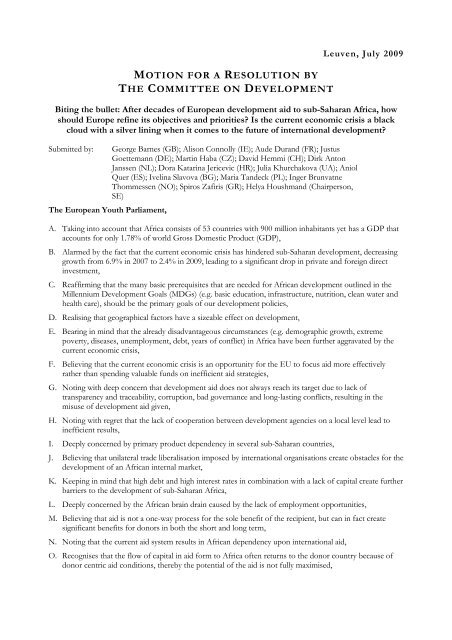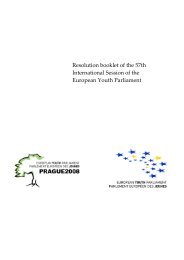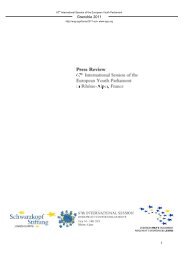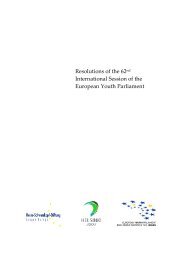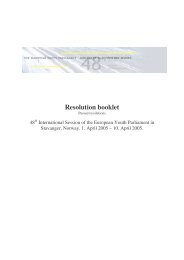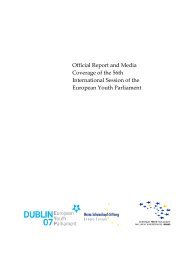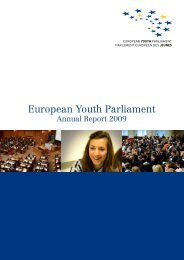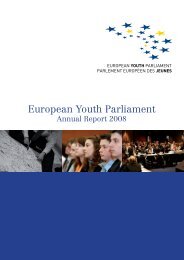Resolutions booklet in English - European Youth Parliament
Resolutions booklet in English - European Youth Parliament
Resolutions booklet in English - European Youth Parliament
You also want an ePaper? Increase the reach of your titles
YUMPU automatically turns print PDFs into web optimized ePapers that Google loves.
MOTION FOR A RESOLUTION BY<br />
THE COMMITTEE ON DEVELOPMENT<br />
Leuven, July 2009<br />
Bit<strong>in</strong>g the bullet: After decades of <strong>European</strong> development aid to sub-Saharan Africa, how<br />
should Europe ref<strong>in</strong>e its objectives and priorities? Is the current economic crisis a black<br />
cloud with a silver l<strong>in</strong><strong>in</strong>g when it comes to the future of <strong>in</strong>ternational development?<br />
Submitted by: George Barnes (GB); Alison Connolly (IE); Aude Durand (FR); Justus<br />
Goettemann (DE); Mart<strong>in</strong> Haba (CZ); David Hemmi (CH); Dirk Anton<br />
Janssen (NL); Dora Katar<strong>in</strong>a Jericevic (HR); Julia Khurchakova (UA); Aniol<br />
Quer (ES); Ivel<strong>in</strong>a Slavova (BG); Maria Tandeck (PL); Inger Brunvatne<br />
Thommessen (NO); Spiros Zafiris (GR); Helya Houshmand (Chairperson,<br />
SE)<br />
The <strong>European</strong> <strong>Youth</strong> <strong>Parliament</strong>,<br />
A. Tak<strong>in</strong>g <strong>in</strong>to account that Africa consists of 53 countries with 900 million <strong>in</strong>habitants yet has a GDP that<br />
accounts for only 1.78% of world Gross Domestic Product (GDP),<br />
B. Alarmed by the fact that the current economic crisis has h<strong>in</strong>dered sub-Saharan development, decreas<strong>in</strong>g<br />
growth from 6.9% <strong>in</strong> 2007 to 2.4% <strong>in</strong> 2009, lead<strong>in</strong>g to a significant drop <strong>in</strong> private and foreign direct<br />
<strong>in</strong>vestment,<br />
C. Reaffirm<strong>in</strong>g that the many basic prerequisites that are needed for African development outl<strong>in</strong>ed <strong>in</strong> the<br />
Millennium Development Goals (MDGs) (e.g. basic education, <strong>in</strong>frastructure, nutrition, clean water and<br />
health care), should be the primary goals of our development policies,<br />
D. Realis<strong>in</strong>g that geographical factors have a sizeable effect on development,<br />
E. Bear<strong>in</strong>g <strong>in</strong> m<strong>in</strong>d that the already disadvantageous circumstances (e.g. demographic growth, extreme<br />
poverty, diseases, unemployment, debt, years of conflict) <strong>in</strong> Africa have been further aggravated by the<br />
current economic crisis,<br />
F. Believ<strong>in</strong>g that the current economic crisis is an opportunity for the EU to focus aid more effectively<br />
rather than spend<strong>in</strong>g valuable funds on <strong>in</strong>efficient aid strategies,<br />
G. Not<strong>in</strong>g with deep concern that development aid does not always reach its target due to lack of<br />
transparency and traceability, corruption, bad governance and long-last<strong>in</strong>g conflicts, result<strong>in</strong>g <strong>in</strong> the<br />
misuse of development aid given,<br />
H. Not<strong>in</strong>g with regret that the lack of cooperation between development agencies on a local level lead to<br />
<strong>in</strong>efficient results,<br />
I. Deeply concerned by primary product dependency <strong>in</strong> several sub-Saharan countries,<br />
J. Believ<strong>in</strong>g that unilateral trade liberalisation imposed by <strong>in</strong>ternational organisations create obstacles for the<br />
development of an African <strong>in</strong>ternal market,<br />
K. Keep<strong>in</strong>g <strong>in</strong> m<strong>in</strong>d that high debt and high <strong>in</strong>terest rates <strong>in</strong> comb<strong>in</strong>ation with a lack of capital create further<br />
barriers to the development of sub-Saharan Africa,<br />
L. Deeply concerned by the African bra<strong>in</strong> dra<strong>in</strong> caused by the lack of employment opportunities,<br />
M. Believ<strong>in</strong>g that aid is not a one-way process for the sole benefit of the recipient, but can <strong>in</strong> fact create<br />
significant benefits for donors <strong>in</strong> both the short and long term,<br />
N. Not<strong>in</strong>g that the current aid system results <strong>in</strong> African dependency upon <strong>in</strong>ternational aid,<br />
O. Recognises that the flow of capital <strong>in</strong> aid form to Africa often returns to the donor country because of<br />
donor centric aid conditions, thereby the potential of the aid is not fully maximised,


